- News
- Reviews
- Bikes
- Accessories
- Accessories - misc
- Computer mounts
- Bags
- Bar ends
- Bike bags & cases
- Bottle cages
- Bottles
- Cameras
- Car racks
- Child seats
- Computers
- Glasses
- GPS units
- Helmets
- Lights - front
- Lights - rear
- Lights - sets
- Locks
- Mirrors
- Mudguards
- Racks
- Pumps & CO2 inflators
- Puncture kits
- Reflectives
- Smart watches
- Stands and racks
- Trailers
- Clothing
- Components
- Bar tape & grips
- Bottom brackets
- Brake & gear cables
- Brake & STI levers
- Brake pads & spares
- Brakes
- Cassettes & freewheels
- Chains
- Chainsets & chainrings
- Derailleurs - front
- Derailleurs - rear
- Forks
- Gear levers & shifters
- Groupsets
- Handlebars & extensions
- Headsets
- Hubs
- Inner tubes
- Pedals
- Quick releases & skewers
- Saddles
- Seatposts
- Stems
- Wheels
- Tyres
- Health, fitness and nutrition
- Tools and workshop
- Miscellaneous
- Tubeless valves
- Buyers Guides
- Features
- Forum
- Recommends
- Podcast
news
Cyclists and pedestrians should be given priority at roadworks – even if it delays motorists and takes up road space, says roadworks commissioner; Autumn leaf-covered cycle lane or gravel route?; Reclaim the Bike Path + more on the live blog
SUMMARY
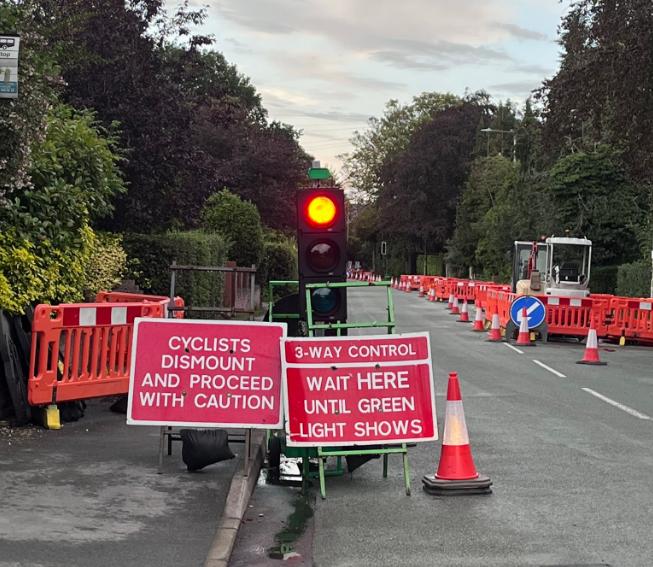 'Cyclists Dismount' sign, Malvern Road, Worcester (Dan Brothwell)
'Cyclists Dismount' sign, Malvern Road, Worcester (Dan Brothwell)12 October 2023, 08:08

Cyclists and pedestrians should be given priority at roadworks – even if it delays motorists and takes up road space, says roadworks commissioner
Cycle lanes and pavements should be kept open during roadworks, and, if that’s not possible, an equivalent space should be provided on the carriageway to compensate for the closed bike lane, ensuring that cyclists, walkers, and wheelers are given priority – even if it holds up motorists, the Scottish Road Works Commissioner has said.
Kevin Hamilton, who was appointed in November 2020 to independently monitor roadworks in Scotland and promote good practice, told the Scotsman that the first major review for decades of the ‘Red Book’ roadworks code of practice – due to be completed by the UK, Scottish, and Welsh governments in 2025 – must prioritise those at the top of the Highway Code’s hierarchy of road users.
> Highway Code: One-in-four drivers still don't know correct rule on cyclist priority
Roadworks in Scotland have recently reached record levels, with 150,000 currently taking place across the country, 60 percent of which are on pavements.
Hamilton says this has resulted in pedestrians being confronted with ‘footpath closed’ signs, while many segregated cycle lanes have been suspended.
“Most works take place on footways so they impact pedestrians most,” Hamilton noted. “The code of practice, which dates back to the 1990s, was written at a time before the concept of a sustainable travel hierarchy became government policy in Scotland.
“It was written very much at a time when the emphasis was on minimising congestion and delays for people in cars and buses. It’s overdue for a review and needs to reflect the sustainable travel hierarchy – to put pedestrians and cyclists at the top.
“At the moment, it says you ‘need to consider’ the needs of these groups, but what it doesn’t do is put them as the priority group. ‘Consider the needs’ is different from ‘You must provide for them’, even if that means you are going to introduce delays and congestion.
“That’s the tricky balancing act, but if we want to encourage people to walk and cycle and wheel, that’s the trade-off there has to be.”
> Council slammed for sending cyclists onto busy roads during bridge repairs
He continued: “At the moment, if you look at a whole load of roadworks sites, you will see a lot where the pedestrian comes up to a barrier and it says ‘Footway Closed’ and they have to cross the road. There is a caveat in the code that allows the footway to be closed if there’s one on the other side [of the road]. That’s fine if you’re fit and able, but it’s not so good if you’re in a wheelchair or have a visual impairment. It can be the difference between completing your journey and not getting out of the house.
“The difference that I see in the future would be you would have to provide something to allow people to get round your works and that might mean that you needed to take up some carriageway space. In an extreme example, you might need to put in some more temporary traffic lights to allow for that to happen, in more scenarios than currently happens.
“If it’s a main cycle route, such as a segregated lane, it may mean you have to provide an equivalent facility on the carriageway.”
The commissioner’s stance has been supported by Ian Maxwell of the Lothian cycle campaign Spokes, who told the Scotsman: “The restrictions and reduced space caused by roadworks can make it dangerous for both pedestrians and cyclists and it's right to give them priority. It's important to make sure that pedestrians are provided with well-marked separate space.”
However, the suggested policy has been criticised by motoring group IAM RoadSmart, whose Scotland-based policy advisor Neil Greig said it was “ridiculous to suggest that there is not enough room given to pedestrians at the moment when many small-scale pavement works already lead to delays for drivers and riders who are not directly affected by the work.
“Unsightly dedicated pedestrian corridors delineated by temporary barriers are often left in place when no work is taking place, or are left in a terrible state with no one knowing who is responsible.”
Meanwhile, Paul White, director of the Confederation of Passenger Transport Scotland, which represents bus operators, said: “Subjecting bus services to an increased level of congestion through roadworks will impact on reliability, increase costs, and is counter to government goals to improve air quality and reduce carbon emissions. A more holistic solution that considers the needs of passengers that cannot walk or cycle is required.”
The status of cyclists and pedestrians at roadworks was in the news a month ago, when we reported that signs advising cyclists to “dismount and proceed with caution” at a set of temporary traffic lights in Worcester were removed, after councillors and local cyclists complained that they were “discriminatory” towards people on bikes, as well as making things “more difficult for pedestrians”.
The temporary lights were installed at the end of July as part of work carried out by Cadent Gas on Worcester’s Malvern Road, and are expected to remain in place until the middle of November.
However, the ongoing roadworks and, in particular, a ‘Cyclists Dismount and Proceed with Caution’ sign located at the lights, attracted the ire of residents and politicians in the West Midlands city, with one councillor urging the local authority to intervene due to the disruption caused to locals.
What do you think? Should carriageway space be devoted to replacement cycle lanes and footpaths at roadworks?
12 October 2023, 15:58
“How often have we seen signs advising motorists to get out and push their cars through road works?” Reader comments of the day, from car-pushing drivers at roadworks to leaves covering broken glass and tree roots
It seems that Scottish roadworks commissioner Kevin Hamilton’s rather sensible comments concerning prioritising the most vulnerable road users have struck a chord with our readers, who are often baffled by the need for cyclists to ‘dismount and proceed with caution’ at roadworks.
“Has anyone tried that,” asked eburtthebike in today’s comments section, “by walking along the middle of the road wheeling your bike at a cautious 2mph?”
Meanwhile, Carol on Facebook asked: “How often have we seen signs advising motorists to get out and push their cars through road works?”
Also on Facebook, Kevin Holland, who says he has helped put together temporary traffic management guidance, wrote that the guidance “already exists to ensure the safety of all road users particularly the most vulnerable”.
But, he continued, “the problem is poorly educated traffic management contractors not adopting the best practice and ignorant councils that don’t know what they should be encouraging and permitting on the highway.
“My advice is if you see a red traffic sign telling you to dismount and you can’t, don’t. If you see a sign telling you to dismount and you legally don’t have to, then you choose.
“Cyclist dismount signs are a valid sign but they are signs of last resort. They are used too frequently when other better options exist.”
Finally, Derek noted: “Cyclists and pedestrians don’t delay drivers. Other cars do.”
Meanwhile, on the subject of leaf-covered bike lanes, Geraint said: “At least when the path is covered in leaves you can’t see the tree roots or broken glass.”
Every cloud, and all that…
12 October 2023, 15:24
‘Ah, but can you do it on a cold, rainy morning in London?’… ‘Yes, easily’
More autumnal cycling antics for you… But wait, I thought cyclists didn’t commute to work in the cold and rain?
“Wait until the pissing rain, they’ll be no cyclists…” pic.twitter.com/4CKyYMyMnq
— Rory McCarron (@CyclingLawLDN) October 12, 2023
12 October 2023, 14:44

“When it works, it is great”: Rim brake devotee Chris Froome finally admits he’s “warmed to disc brakes”
Readers, it’s finally happened.
After years of complaints, exasperated YouTube videos, and roadside tutting, Mr Rim Brake himself, Christopher FroomeDog Froomey Froome, has finally admitted he’s warming up to the idea of those devilish disc things on his wheels.
> Chris Froome posts Bentley ASMR parody bike video – and even touches his disc brake rotor
“When I first started riding with disc brakes, the industry was still quite new to disc brakes,” the four-time Tour de France winner told reporters at Factor’s headquarters in Taiwan this week.
“No fault of Factor, but I think some of the components we were using on the bike weren’t necessarily 100 percent compatible.
“That combination, chopping and changing pieces of equipment, when I joined the [Israel-Premier Tech] team, wasn’t a great thing for the disc brake scenario. It did lead to problems in the first year with the team. My initial impression of disc brakes on the road was skewed by that experience.”
But, despite denouncing disc brakes once again after a few botched wheel changes at February’s Tour of Rwanda, Froome says that “in the last year and a half of running disc brakes I’ve definitely had way less problems and it’s certainly been a lot better, a much better experience for me.
“I have warmed to disc brakes. There's no two ways about it, it does take more maintenance, more work. But when it works, it is great.”
Has one of pro cycling’s longest running storylines finally come to an end?
12 October 2023, 14:18
Nico Denz leads himself out for win at the Tour of Turkey, as Jasper Philipsen crashes in dangerous, twisting finale
With the help with Matt Walls, Nico Denz prevails in the sprint to win Stage 5 of the @tourofturkiye! 🤝 pic.twitter.com/m5TGDsDOtF
— Eurosport (@eurosport) October 12, 2023
At the end of a twisting, wince-inducing, downhill final few kilometres in Bodrum – where this writer spent an, ahem, interesting week on holiday with his friends when he was 18 – Bora-Hansgrohe’s Nico Denz pulled a Mark Renshaw, capitalising on his own lengthy lead-out to take a surprise win on stage five of the Tour of Turkey.
Denz’ teammate Matthew Walls struggled to hold the wheel of his German lead-out man – who hit the front with two kilometres to go – on the plethora of sweeping corners towards the finish, with the 29-year-old holding on for an impressive win as Walls sat firmly behind him for second place, with Astana’s Cees Bol, who was left with too much to do in the closing metres, in third.
While the day in Bodrum belonged to Bora, a late crash during the frankly dangerous finale scuppered Jasper Philipsen’s hopes of a sprint quadruple in Turkey, while Alexey Lutsenko navigated the madness to retain his race lead.
12 October 2023, 13:29
Why don’t cyclists use the cycle lanes? Part 4,978
And the ‘Superfluous Lamppost Stickers of the Day’ prize goes to…
Please @deptinfra , just put some bollards up to stop the cars. pic.twitter.com/danG3NFHfJ
— Dominic Bryan (@Domsball) October 11, 2023
12 October 2023, 12:37
Wiggle and Chain Reaction owner facing “severe liquidity and profitability challenges” as it announces delisting of shares
All is not well once again in Wiggle-CRC land, as Signa Sports United (SSU), the cycling retailers’ parent company, says it is suffering from “severe liquidity and profitability challenges” as it announces the delisting of its shares, citing subdued demand, inventory overstock, and weakened consumer interest in the cycling sector which has adversely impacted its overall performance.
12 October 2023, 11:46
Another blow for British domestic racing as ROKiT-SCRT fold due to lack of sponsorship – with two other elite men’s teams rumoured to close
The dark clouds hovering over Britain’s domestic racing scene show no signs of abating, as one of the country’s most successful men’s elite teams, ROKiT-SCRT – owned by World Super Bike rider Scott Redding – announced yesterday that it is closing its doors after failing to find sponsorship for 2024.
The team, which won three out of the four rounds of this year’s U23 National Road Race series, only last week put a call out to potential sponsors, but that appeal appears to have failed, with the squad now set to add to the growing list of casualties of British cycling’s funding crisis.
“It is with great sadness that we must announce that the SRCT will not continue after the 2023 season,” the team said in an Instagram post.
“This is due to a lack of sponsorship available to continue running the team sustainably. We would like to tank all of the current sponsors, staff, helpers, and riders for a fun and successful season and wish you all the best in the future.”
> British racing scene is “a real struggle”, says Ineos Grenadiers manager Rod Ellingworth
The news adds to the increasingly long line of collapsed British domestic teams in recent months, following the demise of the long-standing AT85 Pro Cycling team in March, just months after fellow Continental-level outfit Ribble Weldtite called it a day due to a lack of sponsorship.
Following SCRT’s announcement, the British Continental also reported that there are rumours circulating that two other elite men’s teams are also set to close, with Russel Rowes of the Embark Spirit BSS team confirming that they are currently “reviewing our position” and that a decision on the squad’s future will be made next month.
12 October 2023, 11:19
The fallout from Crankgate continues…
The USA lawsuit alleges that Shimano was aware “for years” that the bonded components of its cranksets could break, yet waited until just last month to issue a recall and inspection programme.
12 October 2023, 10:57
That one means something: Elia Viviani secures first WorldTour win in four years, outsprinting stellar field at Tour of Guangxi
Elia Viviani just won his first World Tour race in over four years! 😍
Look at what it means! 👏👏👏#TOG2023 pic.twitter.com/K2drdkPjuv
— Eurosport (@eurosport) October 12, 2023
As controversy-evading commentators used to say back in the doping scandal-laden days of the 2000s – ‘Anyway, back to the racing…’
And, after the start of the Tour of Guangxi was marred by stupidity and crassness, the Ineos Grenadiers’ Elia Viviani ensured that all our attention was fixated back on the road for stage one in Beihai, as the veteran Italian used all his tactical nous and years of experience to time his sprint to perfection and beat a stellar field including Jonathan Milan, Sam Bennett, Arnaud De Lie, and Olav Kooij.
The 34-year-old’s victory is only his fourth since returning to the British squad from Cofidis at the start of 2022, and marks his first WorldTour-level win for over four years, when he won the Hamburg Classic for Quick-Step in August 2019, at a time when he was regarded as one of the fastest riders in the world.
Class is permanent 👌🏻👊🏻🍺 https://t.co/5StkCQoTNU
— Luke Rowe (@LukeRowe1990) October 12, 2023
After that long drought, you could tell from Viviani’s celebration how much this morning’s win means…
12 October 2023, 10:24
“It was never our intention to harm anybody”: Intermarché-Circus-Wanty riders apologise for racist gesture after being withdrawn from stage race in China by team
Intermarché-Circus-Wanty riders Madis Mihkels and Gerben Thijsen – who were withdrawn by the Belgian team from the Tour of Guangxi, which started today, after posting a photo of a racist gesture on social media – have apologised for their actions, claiming that “it was never our intention to harm anybody”.
Yesterday, Intermarché announced that 20-year-old neo-pro Mihkels had been pulled out of the race after he was captured making made a crude, offensive gesture with his eyes as part of an Instagram story on Thijsen’s account. The 25-year-old Belgian sprinter was also withdrawn from the race later in the day.
The Belgian team said that “necessary disciplinary steps” will be taken “to close this incident”.
Some words about what happened yesterday pic.twitter.com/h1L7o0Qxi0
— Gerben Thijssen (@Thijssen_Gerben) October 12, 2023
And this morning, Mihkels and Thijsen issued a joint statement on the Belgian’s Twitter account, apologising for their behaviour and “lack of education about Asian culture” and accepting that the social media post was “offensive and wrong”.
“We felt honoured to be invited to participate in the Tour of Guangxi,” the teammates wrote.
“We feel really sorry for what happened yesterday morning, we realise that our social media publication was offensive and wrong. We feel really good in a multicultural environment, so it was never our intention to harm anybody.
“We want to apologise for our behaviour and our lack of education about the Asian culture to all people who felt offended, especially the Chinese fans and all parties involved in the organisation of the Tour of Guangxi.
“We accept our withdrawal from the race. This error is an important life lesson for us both, which will definitely guide us to adopt a more humble attitude in the future.”
12 October 2023, 09:54
Reclaim the Bike Path: Cyclist frustrated by neglected, leaf-covered bike paths takes matters into their own hands
Slightly different location this morning, a bit closer to home . This is a shared use path in Comber #reclaimthepath #AdoptACycleLane Once again neglected by the utterly useless AND Borough Council. Got about half of it done in the time I had. pic.twitter.com/iUZlGwHYKR
— Belfast Cyclist (@BelfastCyclist1) October 9, 2023
Today’s autumnal live blog theme continues, because while Cork cyclist Conn bemoans the foliage-dominated death trap, sorry I mean cycle lane, on his way to work, about 250 miles to the north one cyclist has decided to take matters into their own hands… by sweeping up every leaf-covered bike path within riding distance.
The cyclist, who goes by Belfast Cyclist on Twitter (or whatever) has spent the last few days filling bin bags full of leaves on the neglected bike paths and greenways of Co Down.
That's a wrap for this path, it took me five hours in total. I had to gather the leaves from some sections or they would just have blown back over the path. Eighteen of the bags you see in the photo filled and strategically relocated nearby 🙃.
Be the change you want to see.… pic.twitter.com/bZbYMa6j9f— Belfast Cyclist (@BelfastCyclist1) October 10, 2023
The cyclist’s selfless, exhausting work – one section of greenway took five hours in total to clear, while yesterday’s path looked like it had never been swept by the Ards and North Down Council since it was built, according to the rider/sweeper – has even inspired them, perhaps in a sleep-deprived haze, to think about creating a “leaf sweeping bicycle”.
I’m not joking.
“A reverse trike (two wheels at front) cargo bike, the cargo bit being the leaf collection receptacle,” they sketched out. “Some sort of sweeping device on the front which can be raised for cycling to the work site and then lowered to do the collecting.”
Hardcore scraper action - 🔞 pic.twitter.com/8xIE4DRhCo
— Belfast Cyclist (@BelfastCyclist1) October 11, 2023
Or maybe the “utterly useless” council could just, you know, clear the leaves every once in a while.
12 October 2023, 09:38
Ouch…
Because of you. https://t.co/8gCIM61rQe
— Jon Burke 🌍 (@jonburkeUK) October 11, 2023
That one’s going to sting in the morning.
12 October 2023, 08:48
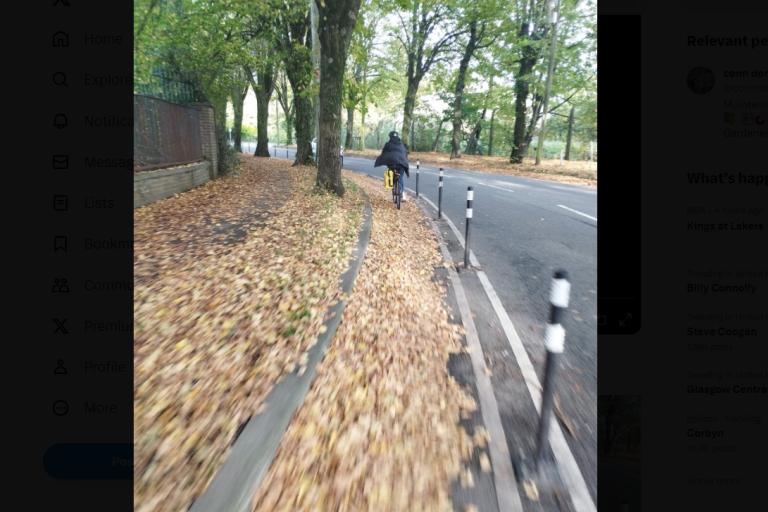
“Why wait until someone gets hurt?” Cyclist complains that busy leaf-covered bike lane hasn’t been swept for weeks
Ah, that’s why gravel bikes are so popular these days…
It turns out that they’re not just for messing around off-road and aspiring to hipster status – they’re also pretty handy when it comes to navigating autumnal-themed cycle lanes neglected by local authorities.
> The joy of British bike lanes in autumn — leaves and puddles aplenty
Judging by the photos and videos he’s posted on X/Twitter over the last few days, Cork cyclist Conn could be doing with a set of knobbly tyres, as the increasingly orange and mulchy bike lane he uses to commute to work appears to be aiming high at road.cc’s coveted ‘Why don’t cyclists use cycle lanes? 2023’ awards night (and believe me, it’s a fierce contest, that one).
The bike lane on Cork’s Centre Park Road, described by Conn as “the only continuous cycle lane out of the city and the primary cycle to the south east suburbs”, has not been swept by the council for the past two weeks, prompting one social media user to label it “nice and lethal”.
This is the only continuous cycle lane out of the city and the primary cycle to the south east suburbs.
It's not unreasonable to ask for it to be swept 1-2 a week during the months of October and November.
Why wait until someone gets hurt? https://t.co/ZVWWZinDyj pic.twitter.com/3ZrhjU7Tj3
— conn donovan (@conndonovan9) October 11, 2023
“It’s not unreasonable to ask for it to be swept [once or twice] a week during the months of October and November,” Conn said.
“Why wait until someone gets hurt?”
Unbe-leaf-able… I’ll get my coat.
After obtaining a PhD, lecturing, and hosting a history podcast at Queen’s University Belfast, Ryan joined road.cc in December 2021 and since then has kept the site’s readers and listeners informed and enthralled (well at least occasionally) on news, the live blog, and the road.cc Podcast. After boarding a wrong bus at the world championships and ruining a good pair of jeans at the cyclocross, he now serves as road.cc’s senior news writer. Before his foray into cycling journalism, he wallowed in the equally pitiless world of academia, where he wrote a book about Victorian politics and droned on about cycling and bikes to classes of bored students (while taking every chance he could get to talk about cycling in print or on the radio). He can be found riding his bike very slowly around the narrow, scenic country lanes of Co. Down.
Latest Comments
- Rendel Harris 4 min 3 sec ago
The police are obliged to investigate but they have considerable licence, along with the CPS, to decide if an offence has been comitted and/or if...
- quiff 7 min 8 sec ago
Agree it's generally much less stressful. With one exception - tailgating HGV drivers who are insistent on doing 56mph. I don't know if they think...
- Gbjbanjs 28 min 52 sec ago
I think you are right about being too close to the vehicle in front. However, the fact that the lead rider had to take evasive action to avoid a...
- mdavidford 30 min 3 sec ago
As an aside, Google's proposed route included this.
- anke2 41 min 3 sec ago
Check their website. These "inventors" run a social media agency and seem to make most (startup) money from a business selling pictures/movies of...
- mdavidford 48 min 10 sec ago
You said you agree with Councillor Bates, whose case is that there is £80k of active travel budget for Dyffryn Ceiriog and no active travel...
- E6toSE3 1 hour 21 min ago
One for shopping list. Need a new rear light. Varia and Magicshine have been the two options, this makes it 3....
- Shreds 1 hour 50 min ago
Another vote for Mercian here. They did a frame for me years ago. Superb job. ...
- Ihatepigeons 1 hour 55 min ago
I'll stick to Sainsburys own brand jelly beans thanks.
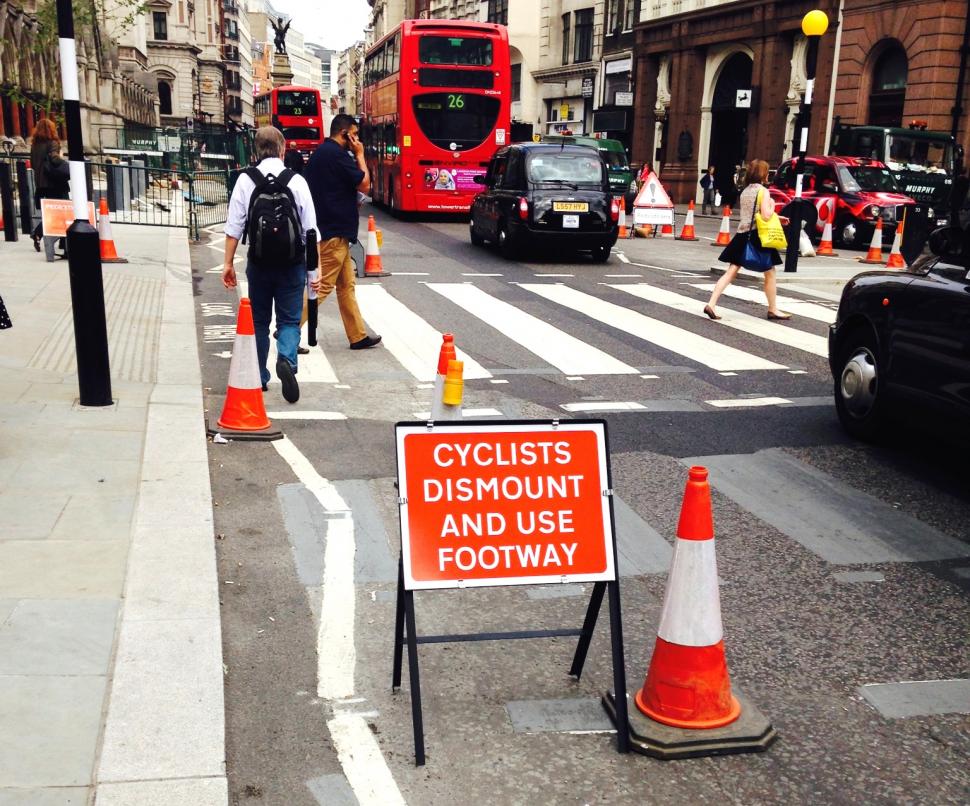
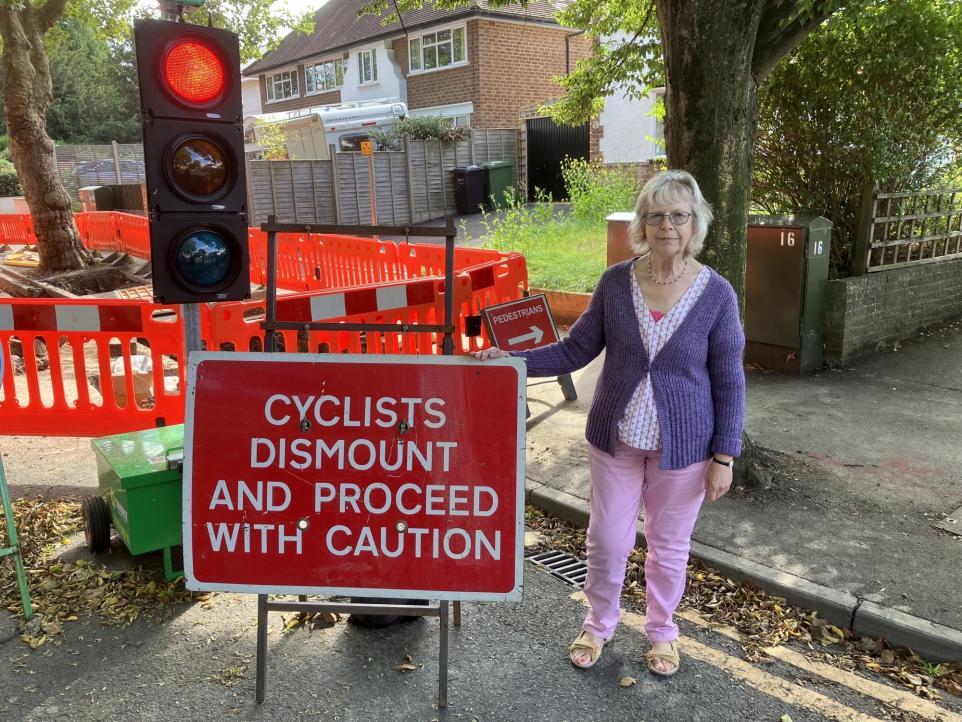
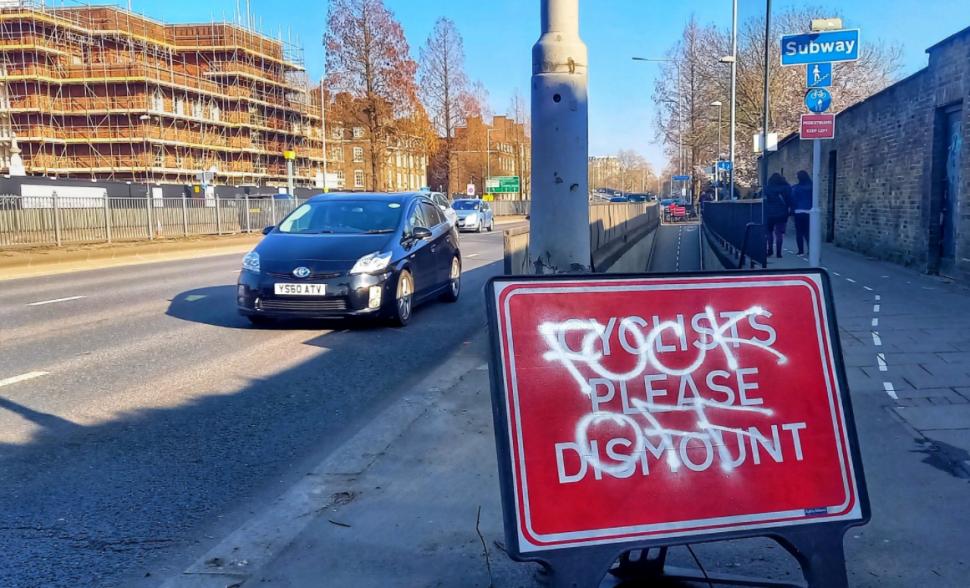
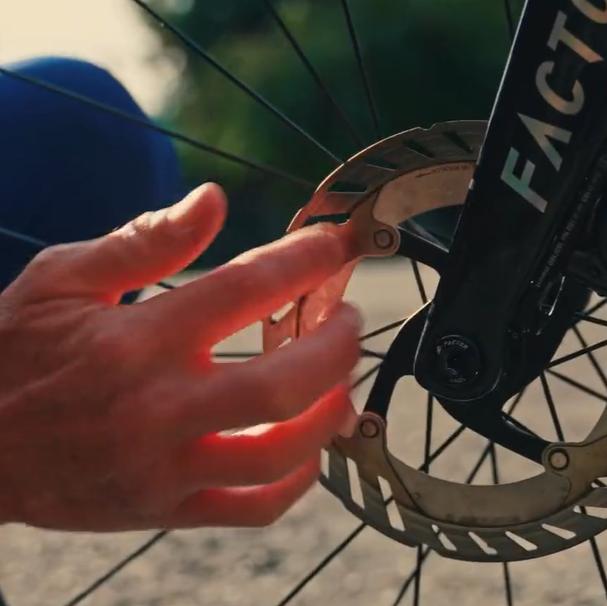

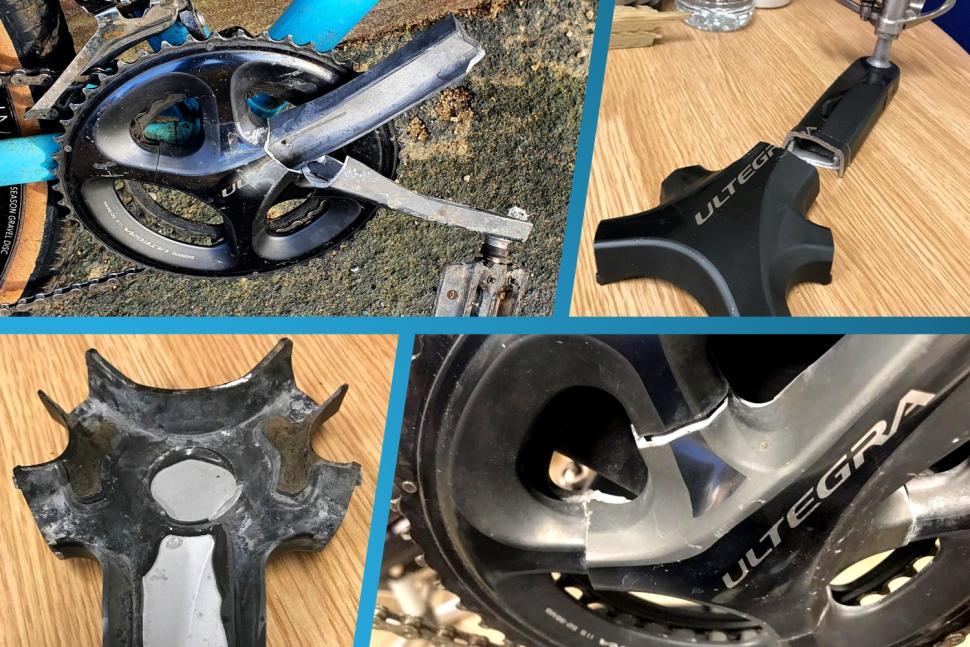
Add new comment
24 comments
Given the "cyclists dismount" signs are in principle nonsense as cyclists are legally allowed to stay on the road (unless its a motorway), having similar signs for drivers would be laughed out of the room.
But if anyone sees a "cyclists dismount" sign and wants to show how ridiculous it is, feel free to print off this and attached it to the bottom:
The comments from the Road Works commissioner are welcome, but his attitude and framing are still way off.
It is framed as negative for motor vehicles - "we are going to have to inconvenience drivers", which stirs up conflict.
A correct framing would be "all highway users are equal, and we will be giving them equal care - paying attention to the requirement to protect vulnerable users in a risk situation."
If it was actually following the legal position, he would be acknowledging that highway users who are not in motor vehicles are more important than people driving, and there by right, whilst people driving are only permitted there as they have earned a license. I think this is a special feature of the UK; do other countries have a similar legal rule?
Neil Wotsit of IAM Roadsmart needs to be sent to a re-education camp to understand reality. I wonder if he has nearest and dearest who are wheelchair users?
The whole thing is a welcome small step towards removing motornormativity from our culture. Deep reform of the professions that define our Highway Network is imo the most important strategic objective for active travel activists.
Presumably Mark Harper and Rishi Sunak are about to have a blue fit.
"CYCLISTS DISMOUNT AND PROCEED WITH CAUTION"
Has anyone tried that, by walking along the middle of the road wheeling your bike at a cautious 2mph?
No, I just move the illegal sign out of the way.
Good to see that leaf-clearer "being the change you want to happen". There's too much "I want my rights and immediately, never mind the costs to the someone else I want to provide them" these days.
On the other hand, leaves on the ground in autumn are a natural phenomenon that no one is going to stop, although stupid people in some cities are trying by cutting down all the trees. Good if a council has the wherewithal to clear a leafy cycle path periodically but many councils are now broke ....... and there are others who perhaps need council dosh rather more than some cyclists feeling a bit wary about "leaves on the
linepath"..There are tyres that will cope with lots of rotty leaves on the road. The Schwalbe studded tyres meant for ice, for example, work quite well through leaf slime too, I can tell you from experience. In fact, I use mine for the rotted vegetation and slimey roads much more than I do for riding on ice. I imagine some gravel tyres will also work well to minimise slides, as will riding more carefully.
**********
Perhaps I yam just a bubbled olescrote full of outdated attitudes but I do tend to find all this whining about the world not being perfek for what the various me-my-Is want rather tedious. That Belfast cyclist has the right idea. If you don't like it, change it yoursen.
Well, you should count yourself timeless. You can read folks complaining about "people nowadays are so selfish and just want it all done for them" back about as far as there's been writing (certainly a couple of millenia)!
Often it's pretty simple to separate the sooth sufferer from the scammer. "I want to be able to drive everywhere and then leave my car right there!" is selfish (although now expected). "I want to be able to use a path, like normal people with legs do - but not having them I'm happy to use a wheelchair / trike ('cos otherwise I'd have to drag myself along the ground, wouldn't I?)" isn't really.
On the leaves - I'm a bit mixed on this, the notion of community-minded independent folks banding together on public works for their own benefit and others' is attractive. I think though I fall on the side of "probably should be council, like the roads and indeed footways".
Although if we suddenly said "do you drive? Over to you to maintain the roads! We reckon you could set up a Facebook group or something..." that might shake things up a bit.
I think there is a specific leaf issue with cycling. It's where we put the cycling-places. Cycle lanes collect leaves, cycle paths and cycle lanes are often right under or by trees. Councils clearly find cleaning cycle lanes tricky so many tend not to and it really doesn't feel particularly pleasant clearing cycle lanes yourself as traffic passes!
The thing about leaves falling off trees is that they don't do it on one single day but rather over several days and sometimes several weeks. In practice, a council would have to clear leafed-over paths many times per autumn. Costly, that. Let the cyclists buy suitable tyres instead; or go more carefully.
And where do we draw the line? I walked and cycled thousands of miles on the canal footpath near where I used to live, over about 30 years. The Canal & Riverside Trust didn't make the muddy, snowly, leafy and otherwise not-pristine for walking and cycling parts all neat and tidy - and nor did anyone expect them to. (Well, there were actually a cpuple who did - moan, moan, moan). Humans already bugger about far too much with the environment, paving paradise etc..
Nor did the council have dozens of litter pickers cleaning the detritus from the miles and miles of footpaths about the place. I did that, as did others. When a passerby (after chucking some of their own litter) remarked that, "The council should do that", my standard reply was, "Are you willing for your rates to go up £20 a year to pay for the staff?" No, they weren't. Nor to pick up the litter they complained about (after making some themselves before my very eyes).
The disabled? I'm all for making life easier for them and everyone else - up to a point. That point doesn't include an infinite budget nor the despoliation of the natural world just to enable all humans to go about utterly unimpeded by the slightest impediment, discomfort or difficulty. Paradise really is paved over, with hardly anything you can see left in a natural state. If its not humans its the bluddy sheep and coos!
EDIT - actually - what's wrong with a council clearing the leaves, say, twice instead of once? Or indeed - even once, in many places? I'm not seeing calls for a leaves hotline ("get us on the blower!") with sweepers summoned out in the middle of the night...
I'm guessing if they clear the snow in winter (like they might not have to again, so they could clear leaves instead?), and it comes back, they don't say "sorry, we did clear the snow once though! Maybe just wait until spring then drive?"
Now I expected more independent thought. What's wrong with installing cacti, or evergreen trees? Couldn't we start an intensive breeding program for leaf-retaining flora?
Aargh! The Scottish Play! Beetlejuice! In the context of cycling they're almost like mentioning a "top lawyer and safety expert"!
Well ... I hear the argument. I don't think you have to be a buddhist or a philosopher to see that there isn't a principled "just do this one thing, and we'll be happy evermore" point. (And getting older we're probably more prone to say "that's enough! I've never needed it...")
I also incline towards seeking the rough and unfinished, away from all those other sticky humans ... except I realise that I can't do that completely - in fact that's probably 0.001% of my existence. I couldn't hunt my own bike or grow my own tyres.
I'm pretty sure I was just suggesting:
- not making crap inaccessible gates which don't actually prevent what they're supposed to very well
- and maybe improving / maintaining the stuff we already built a bit better
- and as elsewhere, that because people are "lazy", or can't do stuff others can (or think they ought to be able to), and do whatever everyone else does, and do things they think make them look cool ... that we should build cycle infra that panders to those wants (while stealthily reducing driving convenience just a bit and repurposing some road space for active travel).
... but anything could be the thin end of the comfort-wedge (collecting cash for capitalists).
I think the line for me is to ask for things which would not actually cost most much, and might actually benefit them also.
A sensible conclusion .... yet it still begs the question: What are those things? You'll get a thousand different answers.
As to the gate that started the thread - well, make it better without stimulating some worse consequences (the hoolies and despoliaters getting access). Are there better methods of arranging/preventing various kinds of access? Probably - but even those will cost. Even just uprooting the gate and taking it away will cost the coonsill a significant amount per gate.
£20 per year on everyones' rates it is then! Perhaps there'll be an exemption for poor ole pensioners like moi, especially as I only ride on the nice roads?
Perhaps we can take the money off old-age pensions?
I'd say your comments have just blown in from the 1970s, @Cugel.
Councils manage to sweep and clear one kind of public highway, so they can add 1-2% to their budget to road sweeping budget to sweep and clear the other kinds of public highway that require it; it's simply a matter of policy, will and reviewing distorted priorities.
Funding - Council funding has been slashed by English and Scottish Governments, not by local authorities (not sure re:Wales). In Scotland it was frozen in cash terms for 9 years. In England local councils have had funding cut in nearly half since 2010.
So of course a substantial boost is needed, as I argued for in a recent survey by Notts CC where their highest proposal was still well below inflation due to Central Government imposed controls. A third world quality public realm is not good enough.
The Canal and River Trust are an organisation in hock to Chocolate Box Fairy Stories, rather than public facilities the public can actually use. Tow paths were more accessible 100 years ago, when they allowed for two boat horses to pass each other.
I find your attitude to disabled people shocking. Why do you think it is OK deliberately, and illegally since at least 1995 (Disability Discrimination Act), to discriminate in provision of services to people who pay their taxes, and contribute to society? Why is it OK to prevent people using wheelchairs having access to local parks? Do we want them to be locked up in their homes like a distributed 1950s hospital-prison?Why is it OK to prevent people with prams or mobility scooters using public footpaths in towns, forcing the people who *need* the support into roads to get round pavement parked vehicles?
Your objections ('concrete over the countrside', 'too much money' etc) are red herrings. No one is suggesting a wheelchair path up Striding Edge, however the current issue is overwhelmingly barriers on already-metalled accessible pathways, or established surfaces such as former railways or towpaths (at least where the CRT hasn't dug them up).
If only it was so simple. Those 1-2%s add up. Moreover, 1-2% spending on this means 1-2% less spending on that. So, as I keep mentioning, it all comes down to deciding priorities rather than planting a few more magic money trees. This is an unpleasant utilitarian but unavoidable process of all schemes involving budgets and the associated acountancy.
But its increasingly what we have. Ignore reality for wishful thunks if you like but we all have to go further than just wishing to make something actually happen. Will you pay more tax? (I will, gladly; and I'll keep "picking up the litter").
I disagree. I've spend hundreds of hours walking on canal footpaths over decades and observed all sorts of events thereupon. Where the paths have been tarmacked over, there also tends to be severe cutting back or eradication of surrounding flora "to make it easier to maintain". I'd prefer canal footpaths to be part of nature rather than yet another strip of urban wasteland. And the nuisance I found most irksome on these tarmacked wastelands was .... bluddy inconsiderate cyclists doing 20+ mph!
Steady on, old ranter! I don't recall making a case for pavement parking or other restrictions to anyone using town pavements for the intended purposes - nor advocating restrictions deliberately wrought for the sole purpose of keeping disabled people from accessing paths.
Here is your problem, I feel - a parochial and blinkered view of this issue that assumes these barriers are a deliberate attempt to restrict the disabled rather than a perhaps less than ideal attempt to restrict other damaging and dangerous accesses. You should, I feel, consider a much wider perspective.
If you feel the gates discriminate against the disabled unnecessarily then propose another better solution - but one without causing even more harm, even to the disabled now going down those paths who will, like everyone else, be subject to yobs and their various antics with motorbikes, 4-wheeled drives and the like if you merely remove access controls completely. And one that's affordable, even if that means paying more rates yourself.
You might feel that everywhere should be concreted or tarmacked over to enable every access desire of every single human to absolutely everywhere but personally I feel this is a real and present danger to the natural world as a whole, including the humans.
Are we to concrete-path all the footpaths throughout the countryside, up the fells, in the forests, through the fields so that we don't prevent a wheelchair user from going wherever anyone walking can go? In your scheme of rights this would be "fair". in mine in would be highly damaging to the opportunities of everyone to continue having some of the natural world unsullied by human artifice and the elimination of vast swathes of fauna & flora, many down to extinction levels.
Its always tempting to employ former human-degraded sites such as old railway lines into another form of human degraded "service". Personally I think that letting such places go back to nature is a far better option, even it it does mean some unfortunate folk can't easily get in there.
All of us are denied all sorts of services because of circumstances. Where is my local theatre or cinema out here in West Wales? Must I travel all the way to Cardiff!!? Why does the NHS not pay to provide me with rejuvenation services so I don't have to suffer the rots of age? How come they don't stop it raining when I go out so I don't have to buy an expensive waterproof? Is no one going to give me all the lessons, no matter the cost, so I can play the classical guitar competantly before I die?
But I suppose you're even more shocked now that some cruel blighter has denied the possibility of your utopia. Personally, I find a degree of stoicism is a necessary adoption if one is not to get all depressed about how far, far away utopia is. Meanwhile, small improvements here and there can be made .... but don't expect the rest of the world to drop everything else to help with and pay you for them. Although sometimes they might.
Autumn happens every year, it should not be a surprise that certain cycle paths will
need sweeping during the month of October. The councils should not be caught sleeping on this. Do you you think people in the Netherlands would find that acceptable?
As far as I can tell, North Somerset council sends out the leaf picker-uppers once a year, in September ish. This is so they pick up as many leaves as they can in one go before the next season drops...
(edit) ...so you have a nice mulch building up on their cycle paths through the rest of the year. Makes a hill I regularly use, "interesting".
It's always a dodgy argument to say that "there are others who perhaps need the money more"; there will always be others who may have (depending on opinion and perspective) a better right to funds, but the logical conclusion of that would be all money going to a particular cause and none being spent on anything else, it would be like the NHS suddenly deciding that cancer is the worst disease so all funds are going that way and everybody else will just have to put up with whatever ails them. It really isn't too much to ask that councils should keep the highways clear, including cycle paths. We shouldn't get sucked into this Tory lie that "there isn't any money for that sort of thing". Bill Bryson was very good on it, something like (excuse errors, from memory), "When I first came to England in the 70s we were in the midst of a financial crisis, we had the three day week, power cuts, strikes, rampant inflation, goodness knows what, but we still had roundabouts with daffodils on them. Now we are told that we can't have roundabouts with daffodils on them because there isn't any money to plant them. If we had the money back then we have the money now." The only reason councils don't have the money is because successive governments have refused to levy taxes at anything like an appropriate level, don't fall for the "stop moaning about it because other people need that money more than you" line, that's just legitimising the failure to raise sufficient funds for all the requirements of a decent society in favour of giving as many breaks as possible to those who have far more than everybody else anyway.
All good points but still trumped by the incontrovertible fact that government money + rates collected is a finite sum.
And as for the NHS - a vast amount of money is currently spent on all sorts of costs incurred that need not be if various people stopped living lives of self-indulgence, self-abuse and self-neglect. This is true of many public services, where money is spent in large amounts to cater to those who demand vast rights but perform no duties themselves to help reduce their demands and their costs.
This isn't to say that we should stereotype various groups as all worthless and not deserving of various aids and comforts from the public purse. But there has to be a practical line drawn somewhere if there's no infinite purse. To draw the line requires hard choices about who will fall on which side of it.
Like you, perhaps, I'd prefer to have far more in the way of public services (and far less of the private not-services-at-all). I'd happily pay another 10p in the pound income tax if the dosh was spent on much better publice services. But there'd still be a limit to the size of the coffers and therefore a limit to what public services (and their levels) could be afforded. The problem of the cut-off line for spending on this or that therefore still remains and always will.
We'll all tend to have different priorities we'd like to see applied in public purse spending. Personally I'm leery of catering to those who want every possible facility, no matter how small, without any regard to other needs of other folk. (Prime example: motorists). Despite being a regular cyclist, I can think of a hundred things local authorities would be better spending money on than lots of badly designed half-arsed shared paths that often go nowhere much that anyone wants to go.
By all means improve active travel facilities in heavily populated places where its possible to do so without it costing £10million per mile, cutting down trees or even knocking down houses. I'd prefer to see such encouragemnt by the simple means of discouraging cars as per LTN; and a much more draconian ULEZ arrangement. It would cost nearly nowt and involve no need for vast new infrastructure for vast costs, financial and otherwise.
In short, so-called cycling infrastructure is a needless distraction because the problem is far too many cars - a much larger problem than just putting cyclists off going on the roads. Cycling infrastructure does nothing to solve the too-many-cars problems, which seriously damage a thousand times more folk than just we cyclists.
I sincerely apologise. In my defense, although I only went to the doctor twice in the last decade and the hospital once, I could maybe have gone less. Or rather, gone to the doctor more, and gone to hospital less...
As you say - it's about setting priorities.
I think we could spend a little less on the roads, and (like Scotland has done) direct say 10% towards active travel? (Yes, Scotland needs to be showing a bit more for it...)
I do agree that the problem is the popularity of this driving lark. I'm just not seeing likely strategies of persuading us all different which don't involve some lures in the form of e.g. cycle space. (Cycling or walking can also tick some of those NHS and social service spending reduction boxes...).
I'd agree that we can utilise the side benefits of LTN and ULEZ to try to make cases for change. Unless you made LTNs like what their naysayers are trying to suggest and everywhere I don't think that would seriously drive down motoring. Also without also "priming the pump" with initial extra spending on alternatives - public transport and active travel - the task would be harder AND you'd miss opportunities to push AND pull people out of the car.
I think the recent ULEZ expansion in London (not informed on others) works because it's largely codifying an existing situation. Original London ULEZ region was AFAIK in a region with some of the most comprehensive public transport in the country.
I was imagining you might have some entertaining novel ideas for the motoring excess, like declaring an open season on the species.
I think you need to check up on the actual cost of mobility on mobility infrastructure.
It's really very cheap by comparison.
Example: Notts County Council are currently spending £45 million on fixing ONE traffic island on the Nottingham Ring Road.
That is about the same as the money spent in one year on the entire Nottingham Tram System, which carries around 15 millions passengers per annum. And that is only so high because the just built 2nd line to extend the system was a PFI project.
For a comparison, all of the money spent on cycling initiatives in London per annum in recent years has been around £150 million a year, which is a fleabite for the results delivered. Just 5.5% of the TFL tarnsport budget.
Lobby the coonsill for a change of priorities, then. Ranting at me won't achieve owt. Of course, you'll have to overcome an enormous inertia of extant practics, including mad assumptions about the importance of cars and all sorts of corrupt practices with the money. I suppose we could arrange a revolution .... but you know what they say: "Meet the new boss, same as the old boss".
Of course, you'll have to overcome an enormous inertia of extant practics, including mad assumptions about the importance of cars and all sorts of corrupt practices with the money. I suppose we could arrange a revolution .... but you know what they say: "Meet the new boss, same as the old boss".
I'm trying to imagine your own utopian preference but all I can see is endless ribbons of tarmac and concrete everywhere with various humans in machines going up and down them for reasons I can't grasp. To the sides are dead run-over beasts, with those still alive fruitlessly searching through the mud-patched brown grass for summick to eat and a hole to live in.
I once spent over 4 hours clearing an 18" (0.5 m) wide path through the snow on 0.6 miles (1 km) of a multi-use path that is part of my commutes. The city and the park district do nothing. It wasn't a net time savings for me, just good exercise. My other choices were to trudge the bike through it each day, probably plus ten minutes each direction, or take my bypass route that involves busy roads and more distance.
Every time I used it after clearing the path, there was at least one person walking in my handiwork.
I offers my admiration at your getup&go. Also the recognition, from doing similar stuff, that there's a great deal of pleasure from having one's smug-meter hit the max-stop.
The feeling from doing stuff like this that I enjoy the most is a feeling of ownership. If I pick the litter, clean a path or perform any other such regular improve-it task, somehow this provides a visceral connection to the place. I did come to regard about 15 miles of the Lancaster Canal as mine, with the associated pride of ownership as well as the feeling of being embedded in that place.
Nowadays I own even longer stretches of the forest tracks in Fforest Brechfa. Me smug meter is broke.
Excellent work.
Dave McCraw used to have a video of him clearing his route with an improvised bike snowplough. (He took his site down a while back though). I think it would only scratch the surface it your example however!
Belfastcyclists before leaf cleaning pic is what most shared paths look like post leaf pick in Autumn ime.
Even when the local council bothers to do its annual leaf clearance, they always drive their truck along the path to save them the effort of walking too far with bags of leaf waste.
Blimey, I thought the world had changed this morning! I saw:
... and read what Kevin Hamilton (Scottish Road Works Commissioner) unbelievably coming out with a sensible "on balance, favour vulnerable road users" line.
Wow. That's ... more like what they do over in NL (where of course this all works just fine) - here and a whole series here.
Luckily - someone restored things to normal:
Because pavements have got nothing to do with drivers and riders, indeed why do people even walk there rather than using the main carriageway like everyone else? It's just pandering to the pedestrian! Personally I live in my garage so I never use them!
He then goes on to drop some other buzzwords, perhaps revealing where he's at e.g. "unsightly"...
Then Paul White, bus man - slightly better (ish) - "A more holistic solution that considers the needs of passengers that cannot walk or cycle is required."
Quite right - when I lived in flats I used to regularly see the buses coming up in the lift to collect mobility-restricted passengers direct from their doors. They certainly never had to get to a bus stop via a footway (which definitely never got dug up for works)...